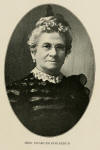BIOGRAPHY - HANNAH BOGARDUS
 Mrs.
Charles Bogardus, nee Hannah W. Pells, only daughter of the late William H.
Pells, one of the founders of Paxton, first saw Paxton in 1860, on a visit
with her father and brother, little thinking it was destined to be her
future home, where the greater part of her life would be spent.
Mrs.
Charles Bogardus, nee Hannah W. Pells, only daughter of the late William H.
Pells, one of the founders of Paxton, first saw Paxton in 1860, on a visit
with her father and brother, little thinking it was destined to be her
future home, where the greater part of her life would be spent.
In April, 1872, she left her old home in Ridgeway, Orleans county, New York, where she was born and married, and with her husband, Colonel Charles Bogardus, their little daughter and her father, Mr. Pells, came to Paxton, where a family home for them all was established.
Mrs. B., as she is familiarly called by many, is much like her father in disposition and ways, inherits his business traits in a marked degree. She has always been the confidant of her husband, who always counsels with her on propositions of any moment, and he says: "She never advised him wrong." Simple and domestic in her taste, her home is her earthly Heaven.
Flowers are to her a great pleasure, and with the ample grounds of the home, she has gratified her taste with careful selections of choice kinds, among which were forty varieties of roses.
Her large circle of friends is made up for their true worth without a thought of wealth or social position. Many people of lowly station are among her most cherished friends, and by whom she is greatly beloved. It is not strange that she is so well beloved by all. Kind of heart and charitable, but she was wanting her charities unknown. A friend of education, for many years she and her husband kept a certain number of pupils in Rice Collegiate Institute at their own expense; trying to keep it secret, but the young people benefited told it, much to their regret. The writer learns that many young men and women had a helping hand from them. Some are teachers and others occupy business positions today.
Paxton was without a park and she gave a block of ground set to trees for that purpose. The public wanted an addition to the park, again she responded with a gift of more ground, with the only stipulation that the gifts should bear the name of "Pells Park," in honor of her father.
The University of Michigan needed grounds for their engineering studies and other university work, and they had but a small appropriation for it. She and her husband talked the matter over with the university committee, learned their needs and together gave them a deed to one thousand, four hundred and forty-one acres, with three miles of lake frontage, worth about twelve times the amount of their appropriation as appraised by the committee representing the university.
A good wife, best of mothers, a kind-hearted neighbor, most considerate of the welfare of her friends; a noble woman, well worthy to be the wife of her distinguished husband who has been the recipient of high military and civil honors constantly since he attained his majority.
We were told a little story by one of her intimate friends, in confidence, yet we are going to tell it, knowing she would object, as it best illustrates her kindness of heart and consideration of the poor better than a volume could express it. Some years ago during the game season, her husband sent some quail to her, of which she is very fond. A few moments after the quail had been received and put away, a tramp came to the back door and asked for something to eat. Mrs. B. overheard him asking for some meat, saying he had not tasted meat for days. There happened to be none in the house. She at once invited him in, her cook being indisposed, she dressed the largest quail and cooked it with other things, giving him a breakfast that rarely falls to the lot of a tramp. The cook told of it, and her friends of course joked her; her reply was that she only did her duty and would feed quail to one of God's unfortunates again if he seemed worthy. She said the thanks and look of thankfulness given her by the aged man and his words, as he raised his much worn cap, "Lady, that is the best meal I have eaten since I had a home of my own," were worth many times the trouble of dressing and cooking the quail and getting him a breakfast. No person was ever turned away hungry from her door.
Mrs. Bogardus inherited from her father and brother large property interests in Michigan, Illinois, city of Paxton and elsewhere, in which she takes a keen interest. She and her husband spend much of their time at Pellston, the namesake of her father; her deep interest in the growth, and her constant thoughtfulness for the welfare of this youthful city, and the betterment of its people have caused her to be called "The Mother of Pellston," and still her love for Paxton and Paxton interests and her people have never diminished.
She has kept pace with her husband, in all his undertakings has been his faithful helpmate and most valued counselor.
[Handwritten: Died at Pellston, Michigan, July 9, 1923, 7 p.m.]
Extracted 19 Oct 2016 by Norma Hass from History of Ford County, Illinois, From Its Earliest Settlement to 1908, author E. A. Gardner, Volume 1, pages 331-337.



